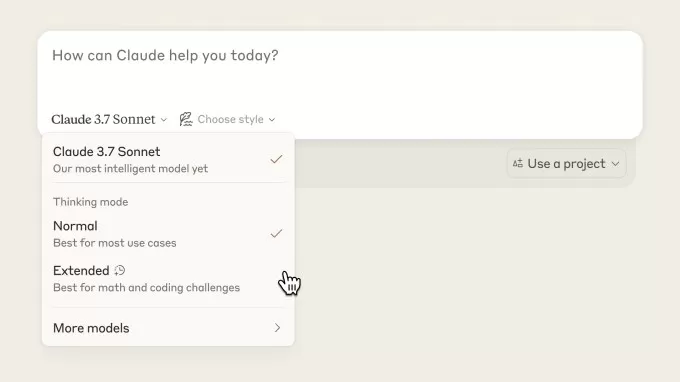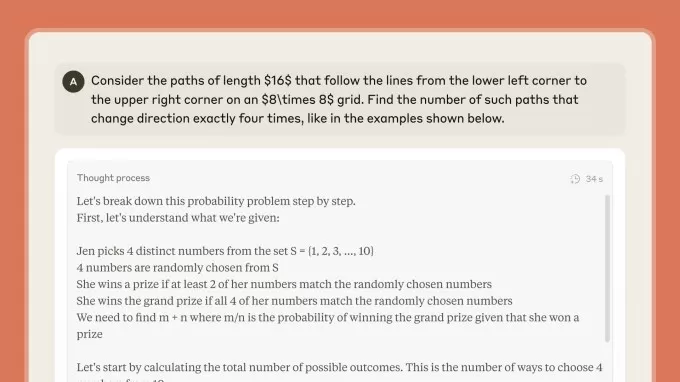Anthropic Unveils AI Model with Customizable Thinking Duration
Anthropic's latest AI model, Claude 3.7 Sonnet, is shaking things up in the world of AI. Dubbed the industry's first "hybrid AI reasoning model," it's designed to give you both quick answers and more thoughtful responses, depending on what you need. You can even choose how long you want Claude to "think" about your questions—pretty cool, right?
The idea behind Claude 3.7 Sonnet is to make using AI a lot simpler. Instead of having to pick from a bunch of different models, Anthropic wants one model to handle everything. Starting Monday, everyone can get their hands on Claude 3.7 Sonnet, but if you want to use its fancy reasoning features, you'll need to sign up for one of Anthropic's premium plans. Free users will still get a solid version of the model, which Anthropic says is better than their last one, Claude 3.5 Sonnet.
Now, about the cost—Claude 3.7 Sonnet will set you back $3 per million input tokens and $15 per million output tokens. That's a bit pricier than some other models out there, like OpenAI's o3-mini and DeepSeek's R1, but remember, those are just reasoning models, not hybrids like Claude.

Anthropic's new thinking modes Image Credits:Anthropic Claude 3.7 Sonnet is Anthropic's first model that can "reason," which is a big deal in the AI world. Reasoning models take a bit more time and computing power to answer questions, breaking them down into smaller steps for more accurate answers. It's not exactly like human reasoning, but it's modeled after it.
Anthropic's got big plans for Claude. Eventually, they want it to figure out how long it should "think" about questions on its own, without you having to set it up. Dianne Penn, Anthropic's product and research lead, told TechCrunch they see reasoning as just one of the many things a frontier model should be able to do, all rolled into one.
With Claude 3.7 Sonnet, you'll even get to see how it plans out its answers through a "visible scratch pad." Most of the time, you'll see the whole process, but Anthropic might redact some parts for safety reasons.

Claude's thinking process in the claude app Image Credits:Anthropic Anthropic says they've fine-tuned Claude's thinking modes for real-world tasks, like tough coding problems or tasks that need a bit of autonomy. If you're a developer using Anthropic's API, you can even control how much "thinking" Claude does, balancing speed and cost with the quality of the answer.
In some tests, Claude 3.7 Sonnet did pretty well. On SWE-Bench, a test for real-world coding tasks, it scored 62.3%, beating out OpenAI's o3-mini, which got 49.3%. And on TAU-Bench, which measures how well an AI can interact with simulated users and external APIs in a retail setting, Claude 3.7 Sonnet scored 81.2%, compared to OpenAI's o1 model, which got 73.5%.
Anthropic also says Claude 3.7 Sonnet will be less likely to refuse to answer questions, making more nuanced distinctions between harmful and benign prompts. They've reduced unnecessary refusals by 45% compared to Claude 3.5 Sonnet.
Along with Claude 3.7 Sonnet, Anthropic's also rolling out a new tool called Claude Code. It's a research preview that lets developers run specific tasks through Claude right from their terminal. In a demo, Anthropic showed how Claude Code can analyze a coding project with a simple command like, "Explain this project structure." You can even use plain English to modify a codebase, and Claude Code will describe its edits as it goes, test for errors, and push the project to a GitHub repository.
Claude Code will be available to a limited number of users on a "first come, first serve" basis.
Anthropic's releasing Claude 3.7 Sonnet at a time when AI labs are churning out new models left and right. While Anthropic's usually taken a more careful, safety-focused approach, this time they're looking to lead the pack. But how long they'll stay ahead is anyone's guess—especially with OpenAI's CEO, Sam Altman, saying they've got a hybrid AI model of their own coming in "months."
Related article
 Claude 4 Unveiled: Next-Gen AI Models Boost Coding and Agentic Performance
Anthropic has launched its Claude 4 model family, marking a significant advancement for developers crafting cutting-edge AI assistants and coding solutions. The lineup features Claude Opus 4, a top-ti
Claude 4 Unveiled: Next-Gen AI Models Boost Coding and Agentic Performance
Anthropic has launched its Claude 4 model family, marking a significant advancement for developers crafting cutting-edge AI assistants and coding solutions. The lineup features Claude Opus 4, a top-ti
 Anthropic Unveils App Integrations and Advanced Research Features for Claude AI
Anthropic introduced on Thursday a fresh approach for linking applications and tools to its AI assistant Claude, along with an upgraded deep research function that lets Claude explore the web, corpora
Anthropic Unveils App Integrations and Advanced Research Features for Claude AI
Anthropic introduced on Thursday a fresh approach for linking applications and tools to its AI assistant Claude, along with an upgraded deep research function that lets Claude explore the web, corpora
 Anthropic CEO: AI Hallucination Rates Surpass Human Accuracy
Anthropic CEO Dario Amodei stated that current AI models generate fewer fabrications than humans, presenting them as truths, during a press briefing at Anthropic’s inaugural developer conference, Code
Comments (54)
0/200
Anthropic CEO: AI Hallucination Rates Surpass Human Accuracy
Anthropic CEO Dario Amodei stated that current AI models generate fewer fabrications than humans, presenting them as truths, during a press briefing at Anthropic’s inaugural developer conference, Code
Comments (54)
0/200
![RaymondAdams]() RaymondAdams
RaymondAdams
 August 11, 2025 at 1:00:59 AM EDT
August 11, 2025 at 1:00:59 AM EDT
This hybrid AI model sounds like a game-changer! Being able to tweak how long Claude thinks is super cool, like choosing between a quick coffee chat or a deep dive convo. Excited to see how this stacks up against other AI out there! 😎


 0
0
![ChristopherDavis]() ChristopherDavis
ChristopherDavis
 August 5, 2025 at 3:00:59 PM EDT
August 5, 2025 at 3:00:59 PM EDT
Claude 3.7 Sonnet a l'air incroyable ! Pouvoir choisir la durée de réflexion, c'est comme demander à un chef de cuisiner vite ou de prendre son temps pour un plat parfait. J'ai hâte de voir comment ça marche en pratique ! 😄


 0
0
![WillieAdams]() WillieAdams
WillieAdams
 August 1, 2025 at 2:08:50 AM EDT
August 1, 2025 at 2:08:50 AM EDT
Claude's customizable thinking duration sounds like a game-changer! I wonder how it balances speed and depth in real-world tasks. Excited to try it out! 😄


 0
0
![ScarlettWhite]() ScarlettWhite
ScarlettWhite
 July 23, 2025 at 12:59:47 AM EDT
July 23, 2025 at 12:59:47 AM EDT
Wow, Claude 3.7 sounds like a game-changer! Being able to tweak how long it thinks is such a cool feature. I’m curious how this will stack up against other AI models in real-world tasks. Anyone tried it yet? 😄


 0
0
![CharlesRoberts]() CharlesRoberts
CharlesRoberts
 April 23, 2025 at 10:11:54 AM EDT
April 23, 2025 at 10:11:54 AM EDT
O Claude 3.7 Sonnet é incrível! Adoro poder escolher a duração do pensamento. Às vezes preciso de respostas rápidas, outras vezes quero respostas mais pensadas. É como ter um amigo AI personalizável! Só desejo que fosse um pouco mais rápido às vezes. 😎


 0
0
![RyanAnderson]() RyanAnderson
RyanAnderson
 April 22, 2025 at 10:04:41 AM EDT
April 22, 2025 at 10:04:41 AM EDT
Claude 3.7 Sonnet is a game-changer! I love how I can choose the thinking duration. Sometimes I need quick answers, and other times I want a more thoughtful response. It's like having a customizable AI buddy! Only wish it was a bit faster at times. 🤓


 0
0
Anthropic's latest AI model, Claude 3.7 Sonnet, is shaking things up in the world of AI. Dubbed the industry's first "hybrid AI reasoning model," it's designed to give you both quick answers and more thoughtful responses, depending on what you need. You can even choose how long you want Claude to "think" about your questions—pretty cool, right?
The idea behind Claude 3.7 Sonnet is to make using AI a lot simpler. Instead of having to pick from a bunch of different models, Anthropic wants one model to handle everything. Starting Monday, everyone can get their hands on Claude 3.7 Sonnet, but if you want to use its fancy reasoning features, you'll need to sign up for one of Anthropic's premium plans. Free users will still get a solid version of the model, which Anthropic says is better than their last one, Claude 3.5 Sonnet.
Now, about the cost—Claude 3.7 Sonnet will set you back $3 per million input tokens and $15 per million output tokens. That's a bit pricier than some other models out there, like OpenAI's o3-mini and DeepSeek's R1, but remember, those are just reasoning models, not hybrids like Claude.

Anthropic's got big plans for Claude. Eventually, they want it to figure out how long it should "think" about questions on its own, without you having to set it up. Dianne Penn, Anthropic's product and research lead, told TechCrunch they see reasoning as just one of the many things a frontier model should be able to do, all rolled into one.
With Claude 3.7 Sonnet, you'll even get to see how it plans out its answers through a "visible scratch pad." Most of the time, you'll see the whole process, but Anthropic might redact some parts for safety reasons.

In some tests, Claude 3.7 Sonnet did pretty well. On SWE-Bench, a test for real-world coding tasks, it scored 62.3%, beating out OpenAI's o3-mini, which got 49.3%. And on TAU-Bench, which measures how well an AI can interact with simulated users and external APIs in a retail setting, Claude 3.7 Sonnet scored 81.2%, compared to OpenAI's o1 model, which got 73.5%.
Anthropic also says Claude 3.7 Sonnet will be less likely to refuse to answer questions, making more nuanced distinctions between harmful and benign prompts. They've reduced unnecessary refusals by 45% compared to Claude 3.5 Sonnet.
Along with Claude 3.7 Sonnet, Anthropic's also rolling out a new tool called Claude Code. It's a research preview that lets developers run specific tasks through Claude right from their terminal. In a demo, Anthropic showed how Claude Code can analyze a coding project with a simple command like, "Explain this project structure." You can even use plain English to modify a codebase, and Claude Code will describe its edits as it goes, test for errors, and push the project to a GitHub repository.
Claude Code will be available to a limited number of users on a "first come, first serve" basis.
Anthropic's releasing Claude 3.7 Sonnet at a time when AI labs are churning out new models left and right. While Anthropic's usually taken a more careful, safety-focused approach, this time they're looking to lead the pack. But how long they'll stay ahead is anyone's guess—especially with OpenAI's CEO, Sam Altman, saying they've got a hybrid AI model of their own coming in "months."
 Claude 4 Unveiled: Next-Gen AI Models Boost Coding and Agentic Performance
Anthropic has launched its Claude 4 model family, marking a significant advancement for developers crafting cutting-edge AI assistants and coding solutions. The lineup features Claude Opus 4, a top-ti
Claude 4 Unveiled: Next-Gen AI Models Boost Coding and Agentic Performance
Anthropic has launched its Claude 4 model family, marking a significant advancement for developers crafting cutting-edge AI assistants and coding solutions. The lineup features Claude Opus 4, a top-ti
 Anthropic Unveils App Integrations and Advanced Research Features for Claude AI
Anthropic introduced on Thursday a fresh approach for linking applications and tools to its AI assistant Claude, along with an upgraded deep research function that lets Claude explore the web, corpora
Anthropic Unveils App Integrations and Advanced Research Features for Claude AI
Anthropic introduced on Thursday a fresh approach for linking applications and tools to its AI assistant Claude, along with an upgraded deep research function that lets Claude explore the web, corpora
 Anthropic CEO: AI Hallucination Rates Surpass Human Accuracy
Anthropic CEO Dario Amodei stated that current AI models generate fewer fabrications than humans, presenting them as truths, during a press briefing at Anthropic’s inaugural developer conference, Code
Anthropic CEO: AI Hallucination Rates Surpass Human Accuracy
Anthropic CEO Dario Amodei stated that current AI models generate fewer fabrications than humans, presenting them as truths, during a press briefing at Anthropic’s inaugural developer conference, Code
 August 11, 2025 at 1:00:59 AM EDT
August 11, 2025 at 1:00:59 AM EDT
This hybrid AI model sounds like a game-changer! Being able to tweak how long Claude thinks is super cool, like choosing between a quick coffee chat or a deep dive convo. Excited to see how this stacks up against other AI out there! 😎


 0
0
 August 5, 2025 at 3:00:59 PM EDT
August 5, 2025 at 3:00:59 PM EDT
Claude 3.7 Sonnet a l'air incroyable ! Pouvoir choisir la durée de réflexion, c'est comme demander à un chef de cuisiner vite ou de prendre son temps pour un plat parfait. J'ai hâte de voir comment ça marche en pratique ! 😄


 0
0
 August 1, 2025 at 2:08:50 AM EDT
August 1, 2025 at 2:08:50 AM EDT
Claude's customizable thinking duration sounds like a game-changer! I wonder how it balances speed and depth in real-world tasks. Excited to try it out! 😄


 0
0
 July 23, 2025 at 12:59:47 AM EDT
July 23, 2025 at 12:59:47 AM EDT
Wow, Claude 3.7 sounds like a game-changer! Being able to tweak how long it thinks is such a cool feature. I’m curious how this will stack up against other AI models in real-world tasks. Anyone tried it yet? 😄


 0
0
 April 23, 2025 at 10:11:54 AM EDT
April 23, 2025 at 10:11:54 AM EDT
O Claude 3.7 Sonnet é incrível! Adoro poder escolher a duração do pensamento. Às vezes preciso de respostas rápidas, outras vezes quero respostas mais pensadas. É como ter um amigo AI personalizável! Só desejo que fosse um pouco mais rápido às vezes. 😎


 0
0
 April 22, 2025 at 10:04:41 AM EDT
April 22, 2025 at 10:04:41 AM EDT
Claude 3.7 Sonnet is a game-changer! I love how I can choose the thinking duration. Sometimes I need quick answers, and other times I want a more thoughtful response. It's like having a customizable AI buddy! Only wish it was a bit faster at times. 🤓


 0
0





























